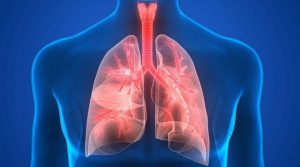This post is also available in:
Tiếng Việt (Vietnamese)

Know the basics
What is pneumonia?
Pneumonia is an acute infection of one lobe of the right or left lung, or a whole lungs. There are many kinds of germs that could cause pneumonia. The infected lungs leak fluids and shed dead cells. This clogs up the air sacks and make it hard for the lungs to get oxygen into the blood. Without enough oxygen, your body cannot function properly.
How common is pneumonia?
Anyone can get pneumonia. Older adults, children and people with chronic disease such as COPD and asthma, are at high risk for pneumonia. It can be managed by reducing your risk factors. Please discuss with your doctor for further information.
Know the symptoms
What are the symptoms of pneumonia?
The common symptoms of pneumonia are:
- Intense cough;
- Fever;
- Shaking chills;
- Shortness of breath;
- Sharp chest pain that gets worse when you breathe deeply or cough;
- Headache;
- Loss of appetite;
- Extreme fatigue;
- Nausea and vomiting.
There may be some symptoms not listed above. If you have any concerns about a symptom, please consult your doctor.
When should I see my doctor?
You should contact your doctor if you have any of the following:
- Persistent fever with shaking chills;
- Chest pain and difficulty breathing;
- You are at a very young age (5 years old) or very old age (65 years old);
- A cough with blood or mucus from the lungs;
- Difficult, shallow, fast breathing with shortness of breath.
If you have any signs or symptoms listed above or have any questions, please consult with your doctor. Everyone’s body acts differently. It is always best to discuss with your doctor what is best for your situation.
Know the causes
What causes pneumonia?
Categorized by the causes, pneumonia have three major types:
- Bacterial pneumonia: caused by bacteria, develop on its own or after a serious cold or flu.
- Viral pneumonia: not very serious and usually lasts for a short time. However, the flu virus can cause viral pneumonia to be severe and fatal. Pregnant women or patients with heart or lung disease should be careful with this disease.
- Mycaplasma pneumonia: have common traits of both viruses and bacteria, cause mild cases of pneumonia.
Know the risk factors
What increases my risk for pneumonia?
There are many risk factors for pneumonia, such as:
- Smoking;
- Respiratory infection – a cold, laryngitis, influenza;
- Chronic lung disease;
- Other serious illness such as heart disease, liver cirrhosis, or diabetes;
- Asthma;
- Having a weak immune system;
- Having HIV or cancer;
- Very young or very old people.
Understand the diagnosis & treatment
The information provided is not a substitute for any medical advice. ALWAYS consult with your doctor for more information.
How is pneumonia diagnosed?
Pneumonia can often be mistaken for a cold or a flu. However, you should pay careful attention as pneumonia usually lasts longer and the symptoms are more severe than other common illnesses.
To determine if you have pneumonia or not, the doctor ask you some questions to know more about your conditions, such as:
- What are your symptoms and how often do they occur?
- Do you smoke?
- What are your medical history?
- Are you taking any medications?
If necessary, the doctor will perform some common tests before making any diagnosis:
- Physical exam;
- Chest X-ray;
- A CT-scan;
- Sputum test, which examine the sputum (the mucus you cough up);
- Bronchoscopy, which is used to view the airways inside the lungs.
How is pneumonia treated?
Treatment for pneumonia mostly depends on different types and its severity. For some cases, pneumonia can be treated at home.
- Treating bacterial pneumonia: Antibiotics is considered the best option to cure this disease.
- Treating viral pneumonia: certain antiviral drugs can help treat this condition.
Read more: Basic first aid techniques
Lifestyle changes & home remedies
What are some lifestyle changes or home remedies that can help me manage pneumonia?
The following lifestyles and home remedies might help you cope with health condition:
- Get plenty of rest
- Drink plenty of fluids to avoid dehydration
- Let yourself cough since it is the way your body gets rids of infection. If the cough is making you hard to sleep at night, breathing difficult, or causing vomiting, you should take medicaition to prevent cough
- Taking acetaminophen (Tylenol) or aspirin can help you reduce fever and make you feel more comfortable.
If you have any questions, please consult with your doctor to better understand the best solution for you.
Sources
- Understanding Pneumonia — the Basics. http://www.webmd.com/lung/understanding-pneumonia-basics#1. Accessed July 23, 2016.
- Pneumonia: Causes, Symptoms and Treatments. http://www.medicalnewstoday.com/articles/151632.php. Accessed July 23, 2016
- Pneumonia – Home Treatment. http://www.webmd.com/lung/tc/pneumonia-home-treatment. Accessed July 23, 2016.
- Pneumonia. http://www.healthline.com/health/pneumonia#Treatment6. Accessed July 23, 2016.
- Review Date: January 4, 2017 | Last Modified: January 4, 2017

